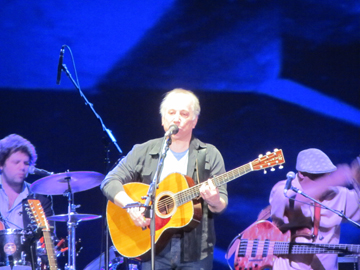
Perhaps the biggest insult you can give to a band these days is to call them a nostalgia act. It was the very fear of that term that led Trey to break up Phish back in 2004. Arguments over whether or not this applies to Furthur can bring a message board to its knees. No one wants to pretend to be a shadow of their former selves.
However, not every performer has a group of people traveling around the country to see show after show. Sometimes seeing an artist is a once a year – or once in a lifetime – treat. That changes the dynamic. You might not want to be a nostalgia act but at the same time you know that people are spending money because this is their one chance to see you perform songs they grew up with. Balancing that can be a challenge.
Paul Simon refuses to give into expectations. At most, his concerts can be seen as a trade: if you let me play the songs that I am excited about, I promise to play a few of the songs that you really want to hear. His inability to pander led to him taking a long time to sell out the 4700 seat WaMu Theater, but the small crowd created a casual environment. When a fan screamed, “We love you,” Simon bantered back, “I used to love me too.” When he forgot a line in “Here Comes the Sun,” he gave an embarrassed smile and then apologized; a bigger arena would have led to him having to be professional and pretend it didn’t happen.
While the new material is interesting, that led to the weird phenomena of being annoyed at an artist playing a good song. The classics were mainly played at the very beginning and very end of the show, leading to some restlessness in the middle. Observing that frustration – along with the arguments over proper concert etiquette between the dancers and those who wanted to be able to see while seated – provided some additional entertainment and raised the question of what a musician owes to the audience. When people are attending to experience something unique, to see improvisation and to be present in a moment that will never be repeated, setlist concern can fall by the wayside. Despite having a talented band, improvisation was almost a bad thing; Paul could be singing “The Boxer” instead of his guitarist taking this solo!
There’s a fine line between thinking, “I paid $100 to see Paul Simon so he better put on a damn fine show,” and, “I paid $100 to see Paul Simon so he better play all of the songs that I love.” That’s what’s inspiring the recent trend of performers playing an entire classic album of theirs. While it’s great to know going into the show that you’re going to see your favorite songs, it does take away some of the drama and excitement of seeing them. No one asked the setlist when I saw Roger Waters on The Wall tour.
Paul Simon isn’t going to play that game. If you’re going to see him later this tour rejoice in hearing an artist play songs that are important to you – “Slip Sliding Away” is one of the songs I use to get through the endless Seattle winters; seeing Simon present that was easily worth the ticket price – but don’t get too caught up to not enjoy the rest of the show. As hard as it can be, try to focus on what he is playing, not what he could be performing instead. Paul Simon writes melancholy songs about loss and falling short of your dreams. Not hearing your favorite is thematically consistent.
*****
David Steinberg got his Masters Degree in mathematics from New Mexico State University in 1994. He first discovered the power of live music at the Capital Centre in 1988 and never has been the same. His Phish stats website is at http://www.ihoz.com/PhishStats.html and he’s on the board of directors for The Mockingbird Foundation. He occasionally posts at the Phish.net blog and has a daily update on the Phish Stats Facebook page


No Comments comments associated with this post